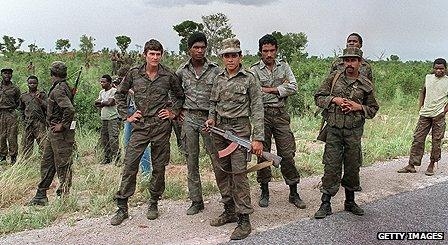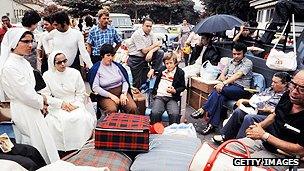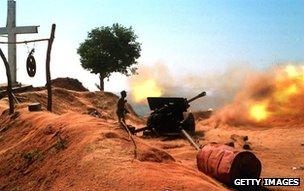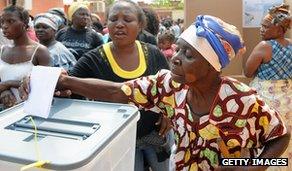Angola profile - Timeline
- Published
A chronology of key events:
1300s - Kongo kingdom consolidates in the north.

Cuban troops deployed in Angola to help fend off South African forces during the 27-year civil war between the MPLA and Unita
1483 - Portuguese arrive.
1575 - Portuguese found Luanda.
17th and 18th centuries - Angola becomes a major Portuguese trading arena for slaves. Between 1580 and 1680 a million plus are shipped to Brazil.
1836 - Slave trade officially abolished by the Portuguese government.
1885-1930 - Portugal consolidates colonial control over Angola, local resistance persists.
1951 - Angola's status changes from colony to overseas province.
1956 - The early beginnings of the socialist guerrilla independence movement, the People's Movement for the Liberation of Angola (MPLA), based in northern Congo.
1950s-1961 - Nationalist movement develops, guerrilla war begins.
1961 - Forced labour abolished after revolts on coffee plantations leave 50,000 dead. The fight for independence is bolstered.
1974 - Revolution in Portugal, colonial empire collapses.
Independence
1976 - MPLA gains upper hand.
1979 - MPLA leader Agostinho Neto dies. Jose Eduardo dos Santos takes over as president.
1987 - South African forces enter Angola to support Unita.
1988 - South Africa agrees to Namibian independence in exchange for removal of Cuban troops from Angola.
1989 - Dos Santos, Unita leader Jonas Savimbi agree cease-fire, which collapses soon afterwards and guerrilla activity resumes.
Towards peace

Expatriates left the country en masse at independence
1991 April - MPLA drops Marxism-Leninism in favour of social democracy.
1991 May - Dos Santos, Savimbi sign peace deal in Lisbon which results in a new multiparty constitution.
1992 September - Presidential and parliamentary polls certified by UN monitors as generally free and fair. Dos Santo gains more votes than Savimbi, who rejects results and resumes guerrilla war.
1993 - UN imposes sanctions against Unita. The US acknowledges the MPLA.
1994 - Government, Unita sign Lusaka Protocol peace accord.
1995 - Dos Santos, Savimbi meet, confirm commitment to peace. First of 7,000 UN peacekeepers arrive.
1996 - Dos Santos, Savimbi agree to form unity government join forces into national army.
1997 April - Unified government inaugurated, with Savimbi declining post in unity government and failing to attend inauguration ceremony.
1997 May - Tension mounts, with few Unita troops having integrated into army.
1998 - Full-scale fighting resumes. Thousands killed in next four years of fighting.
Angola intervenes in civil war in Democratic Republic of Congo on the side of President Laurent-Desire Kabila.
1999 - UN ends its peacekeeping mission.
2002 February - Savimbi killed by government troops. Government, Unita sign ceasefire shortly afterwards.
Demobilisation

Angola's civil war raged for almost three decades
2002 May - Unita's military commander says 85% of his troops have gathered at demobilisation camps. There are concerns that food shortages in the camps could threaten the peace process.
2002 June - UN appeals for aid for thousands of refugees heading home after the ceasefire.
Medical charity Medecins sans Frontieres says half a million Angolans are facing starvation, a legacy of civil war.
2002 August - Unita scraps its armed wing. "The war has ended," proclaims Angola's defence minister.
2003 February - UN mission overseeing the peace process winds up.
2003 June - Unita - now a political party - elects Isaias Samakuva as its new leader.
2004 April onwards - Tens of thousands of illegal foreign diamond miners are expelled in a crackdown on illegal mining and trafficking. In December the government says 300,000 foreign diamond dealers have been expelled.
2004 September - Oil production reaches one million barrels per day.
2005 March-May - Marburg virus, which is deadlier than Ebola, kills more than 300 people, most of them in the north.
2005 June - Chinese Premier Wen Jiabao visits, promises to extend more than $2 billion in new credit, in addition to a $3 billion credit line Beijing has already given Luanda.
2006 August - The government signs a peace deal with a separatist group in the northern enclave of Cabinda.
2006 October - The UN refugee agency begins "final repatriation" of Angolans who fled the civil war to the neighbouring DR Congo.
Elections
2007 February - President dos Santos says parliamentary elections will be held in 2008 and presidential polls in 2009.

2008: Angolans vote in the first parliamentary poll for 16 years
2008 September - First parliamentary elections for 16 years.
2009 March - Pope Benedict celebrates mass in front of more than a million people in Luanda.
2009 October - Angola expels illegal Congolese diamond miners. Democratic Republic of Congo responds by expelling some 20,000 Angolans.
2009 December - President dos Santos suggests presidential elections will have to wait another three years.
State oil firm Sonangol signs a deal to produce oil in Iraq.
Constitutional change
2010 January - Angola hosts African Nations Cup, continent's most popular sporting event. Bus carrying Togo football team is attacked by Cabinda separatists.
Parliament approves new constitution strengthening the presidency and abolishing direct elections for the post.
2010 September - President of DR Congo, Joseph Kabila, visits Angola. Ties between the two neighbours deteriorated in 2009 when Angola began expelling illegal Congolese immigrants and Congo retaliated.
2010 October - UN report into killing of Hutus in DR Congo between 1993 and 2003 says they may constitute "crimes of genocide". It implicates Angola, Rwanda, Uganda, Burundi and Zimbabwe.
2010 November - Convoy carrying Chinese mine workers attacked in the region of Cabinda. A faction of the Cabinda separatist movement Flec claims responsibility.
US urges Angola to investigate alleged rape of women recently deported to DR Congo.
2011 March - More than 20,000 people rally in support for President Dos Santos in response to a reported social media campaign calling on people to demonstrate against the government. Human Rights Watch accuses the government of a "campaign of intimidation" to suppress anti-government protests.
2012 May - Supreme Court annuls the appointment of the head of the electoral commission, upholding complaints from the opposition that she was not politically neutral.
2012 September - Governing MPLA wins a comfortable victory in parliamentary elections, guaranteeing another term in office for President Dos Santos. African Union observers deem the polls free and fair, despite allegations by opposition party Unita about a lack of transparency.
2012 October - Angola launches a $5bn sovereign wealth fund to channel the country's oil wealth into investment projects.
2013 November - Intelligence chief is sacked following an interior ministry report saying the security services were involved in the abduction and killing of two activists.
2014 May - First national census since 1970. Preliminary figures put population at 24.3 million.
Anti-government protesters say they've been beaten and detained for demonstrating against the killing of three activists by security forces.
2014 November - Amnesty International accuses security forces of extra-judicial killings and excessive force, when suppressing dissent against the government.

Anti-corruption campaigner Rafael Marques, who fell foul of the law over his allegations about the Angolan diamond industry
2014 December - Rights groups urge the authorities to stop what they describe as the cruel and inhuman treatment of migrants from other parts of Africa, after more than 3,000 people are reportedly rounded up in Luanda.
2015 April - Mystery surrounds raid on Mount Sumi, with opposition alleging security forces killed some 1000 in action against Seventh Day Light of the World Church. Government demands apology from the UN after it called for a probe.
2015 May - Prominent anti-corruption activist Rafael Marques is given six-month suspended jail term for defaming army generals in a book about violence in the country's diamond mining industry.
2016 August - The Front for the Liberation of the Enclave of Cabinda, FLEC, reports a deadly clash with government troops.
2017 August - Ruling MPLA confirmed as election winners. Joao Lourenco becomes president, begins crackdown on corruption.